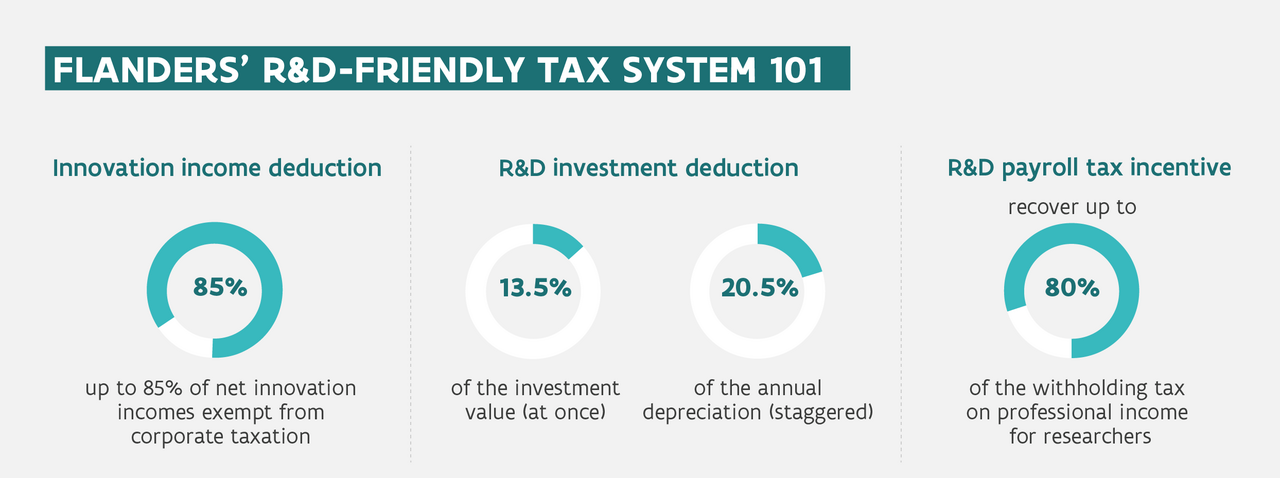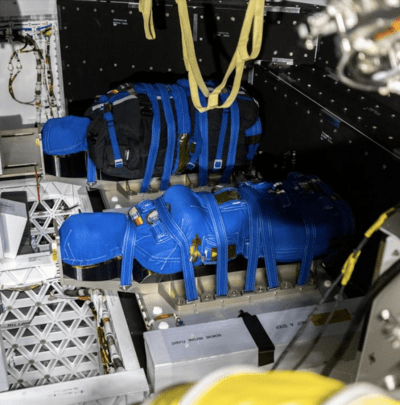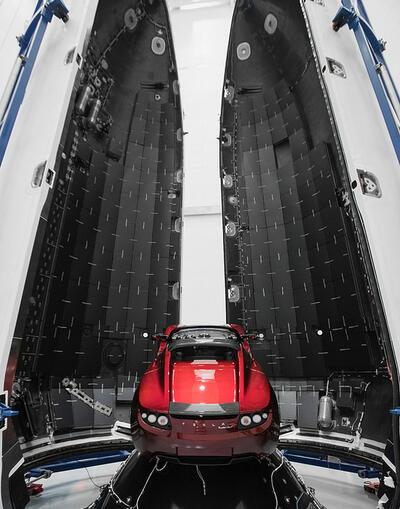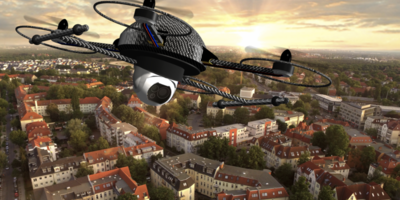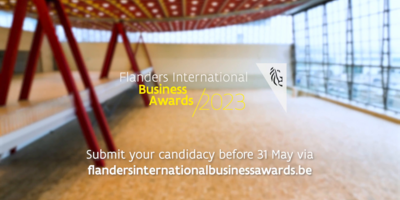
Aerospace
Few domains are at the cutting edge of cross-sectoral collaboration and innovation like aerospace is. Luckily, in Flanders, your company can find all the specialists you need to accomplish your mission. Learn how a constellation of experts can help your business skyrocket and prepare your innovative endeavors for liftoff!
Quick facts about aerospace in Flanders
- Flanders’ space industry achieved a turnover of EUR 320 million in 2020, one-third of which was related to ESA activities (source: Flanders Space, 2022).
- Some 1,400 highly qualified technicians, engineers, scientists and other talented workers are directly employed by space industry players in Flanders (source: Flanders Space, 2022).
- Flanders’ aerospace industry – aeronautics and space combined – generated a total turnover of EUR 1.2 billion in 2016, employing more than 3,900 people in the region (source: Agoria-FLAG).
- In recent years, many fruitful space spin-offs have been established in Flanders, quickly making names for themselves internationally. Think of MAGICS, Arcsec, easics, ICsense, OMP, CMOSIS, EpiGaN, Septentrio …
Strong partners to propel your business and innovation
In Flanders, you don’t need to venture into the vast expanse of aerospace business and innovation opportunities on your own. Far from it! Below are just some of the main “crewmembers” that can back your ambitions.
Federations and clusters
Several federations and clusters stand ready to represent the interests of the aerospace sector and associated industries in Flanders. They can also help drive your business by promoting and facilitating innovative collaborations, among other things. Two prominent organizations in this regard are:
Flanders Space
Flanders Space is Flanders’ cluster organization for the space industry. It, unites companies, knowledge institutes, research centers and the like to shape the industry’s future and put it on the map internationally.
In doing so, Flanders Space focuses on four key areas:
- attracting new talent;
- supporting competitiveness and entrepreneurship;
- providing R&D funding;
- science communication.
Agoria-FLAG
Agoria-FLAG unites companies that are active in the aerospace market. It aims to support the development of aerospace and related technologies in Flanders and boost their visibility around the globe.
To support its members, Agoria-FLAG provides:
- networking and business development events;
- market access initiatives and introduction;
- financing advice and guidance;
- strategic information on growth opportunities and insights about trends, innovation, R&D, etc.
Research centers that support you with flying colors
While the entire academic world in Flanders is highly active in both aeronautics and space R&D, some research centers and knowledge institutes stand out:
- imec, Flanders’ strategic research center for digital and nanotech, specializes in advanced technologies and capabilities to help usher in a new generation of satellites for both Earth observation and space exploration. This includes (but is not limited to) imaging sensors, optical transceivers, radiation-hardened electronics and power electronics.
- VITO, also one of Flanders’ strategic research centers, is a leading reference in cleantech and sustainable development. Its Remote Sensing unit specializes in various applications of remote sensing technology to help companies benefit from earth observation data.
- SCK-CEN, a leading nuclear research center, is a driving force behind groundbreaking R&D in the fields of radiation dosimetry, human biology and microbiology. Its (mostly internationally oriented) research and experiments focus on measuring radiation, protecting astronauts and producing food during space journeys, among other themes.
- LASA, the Leuven Center for Aero & Space Science, Technology & Applications, unites KU Leuven research groups in the fields of aero- and astronautics. Among other things, it focuses on numerical simulation and experimental techniques for scientific analysis in space, aerospace and aeronautics. It also concentrates on technologies for scientific space missions, aeronautics applications and life sciences for aerospace.
- VKI, also referred to as “the von Karman Institute”, specializes in fields such as aeronautics and aerospace, environment and applied fluid dynamics, turbomachinery and propulsion. Its unique infrastructure includes low- and high-speed wind tunnels, plasma facilities, a water tunnel, turbomachinery facilities (including “CT3”, the world’s biggest compression tube), a cryogenic lab, industrial test rigs and aeroacoustics facilities.
Incubators for your sky-high ambitions
Is your innovative aerospace idea promising but not yet ready for launch? Good news: Flanders is home to a variety of incubators and accelerators that foster close ties between the private, public and academic sectors for enhanced innovative and business success. Some of the main go-to partners are:
- imec.istart – As strategic research center imec’s open accelerator program, imec.istart has been offering tech start-ups both pre-seed funding and tailored support to succeed and grow globally since 2011 – with great success. With a start-up survival rate of over 80%, imec.istart ranks as the 4th-best accelerator program across the globe.
- Verhaert Masters in Innovation – With offices across Flanders, Verhaert is a leading provider of integrated product innovation with a specific focus on smart space and security applications. The company also manages ESA Space Solutions Belgium, which is part of the European Space Agency’s Technology Transfer Network. What’s more, Verhaert selects over 100 start-ups every year to help kickstart their innovative businesses as part of its MyStartUp Incubator program.
- BlueSpace – A consortium of VITO, Verhaert and imec, BlueSpace is an incubation program that fosters technological innovation associated with space through services such as coaching, technological expertise and facilities for high-tech start-ups and spin-offs.
A constellation of innovative suppliers, partners and enablers
The aerospace industry and its applications have become indispensable to our daily lives. From precision agriculture and construction to transportation, traffic and logistics, life sciences and smart health, telecommunications, finance and insurance … So many industries use (aero)space technologies and/or data in one way or another. And often, these applications help tackle global challenges such as climate change, the carbon-neutral transition and security threats.
In Flanders, numerous niche players and enablers provide crucial technology, components and expertise in these and other domains. Their specializations range from machinery and robotics, components, maintenance, repair, (space) systems, satellites and sensors to consulting, training, testing, 3D printing, cybersecurity and more. Check out some prominent examples below!
Components, equipment and technologies
- Advionics – Living up to its baseline ‘Beyond avionic technologies’, Oostkamp-based Advionics leverages expertise in wave technologies to develop, manufacture and commercialize high-tech electronic solutions for the aviation industry.
- BMT Aerospace International – Based in Oostkamp, BMT manufactures precision gears, transmissions and actuators for aerospace applications. The company also has subsidiaries in the US and Romania.
- FiXar – Based in Beringen, FiXar is active in the field of industrial fixtures, jigs and tooling for the automotive and aerospace industries.
- Recticel – Headquartered in Brussels and operating 4 sites in Flanders, Recticel’s core portfolio centers around 4 application areas: flexible foams, insulation, bedding and automotive. Highlighting only one of its achievements in the aerospace industry, Recticel helped insulate the Falcon Heavy rocket cabin to protect its onboard satellites from sound vibrations during takeoff, when Elon Musk’s aerospace manufacturing firm SpaceX launched a Tesla roadster into outer space in February 2018.
- SABCA – One of the main aerospace companies in Belgium, SABCA has a subsidiary (SABCA Limburg) in Lummen, Flanders. The firm boasts expertise in designing, building and upgrading large and complex elements for aircraft and space launchers.
- Siemens Industry Software – Originally established as LMS International, a spin-off company of KU Leuven (Flanders), Siemens Industry Software developed into a world-leading reference when it comes to advanced engineering solutions for the mechanical and mechatronic industries, including aerospace and defense applications.
- Space Applications Services – Based in Zaventem, Space Applications Services has a broad spectrum of activities, from manned and unmanned spacecraft and launch/reentry vehicles to robotics and information systems.
- Verhaert – Headquartered in Kruibeke, Verhaert is a leading provider of integrated product innovation and is both broker and manager in the Technology Transfer Network of the European Space Agency (ESA).
Satellite communications and space systems
- Antwerp Space specializes in satellite communications. The company carries out research in advanced communication, engineers space-borne communication equipment, integrates and tests satellite telecommunication payloads, and much more.
- QinetiQ, acquired by Redwire Corporation (US) in 2022, has a space division in Kruibeke (Flanders) formerly known as Verhaert Space. It offers great expertise in avionics, small satellites, cybersecure communications, positioning and navigation, deep-space communications, docking mechanisms, life support systems, scientific instruments and more.
- Septentrio designs and manufactures, among other things, high-end dual-frequency GNSS receivers.
- Thales Alenia Space is a global leader in innovative space systems and operates a plant in Leuven (Flanders) for the development of new avionics products and technologies for satellites and launch vehicles. Its facility in Hasselt (Flanders), on the other hand, is dedicated to the automated manufacture of photovoltaic assemblies for satellites.
|
How QinetiQ’s facility in Flanders supports ESA’s Proba-3 mission Imagine a pair of satellites flying in formation to study the sun’s corona closer to the solar rim than ever before. Sounds like an extremely precise endeavor… Well, it’s exactly what ESA aims to accomplish with Proba-3: the first precision formation flying mission in the world, scheduled for launch in 2024. In 2022, the two satellites involved in the mission arrived the QinetiQ facility in Kruibeke, Flanders. QinetiQ’s local division was trusted with developing the avionics system, integrating all the electronic units within the platform, performing overall system verification and preparing for operations. Talk about taking on an astronomical responsibility! |
Imaging, sensors and sensor systems
- Caeleste has made several major breakthroughs in image sensors for space, scientific and medical applications.
- CMOSIS, acquired by optical solutions leader ams, develops and supplies advanced, off-the-shelf and custom CMOS image sensors.
- OIP Space Instruments designs, develops and manufactures high-end, electro-optical sensor systems, land systems and space instruments.
3D printing services
- 3D Systems, formerly LayerWise, is a spin-off of Leuven University. It masters the direct metal printing (DMP) technology to target both serial production and prototyping. This digital 3D printing tech finds its ideal application in aerospace, as it enables the manufacture of complex free-form parts in a single manufacturing step, using any type of metal.
- Materialise is one of the world’s leading additive manufacturing experts and offers a range of software solutions and 3D printing services. These are applied in some of the most stringent sectors, including aerospace.
Financing your aerospace business in Flanders
If you decide to establish activities or headquarters in Flanders, your business can reap the rewards of:
- government subsidies and support for investments in R&D and innovation, strategic transformation, ecological efforts, growth and other domains.
- fiscal options to help you cut labor costs.
Request a free copy of our brochure to discover more about government support in Flanders.
Tax incentives for research-intensive activities
Flanders offers access to tax incentives that are particularly relevant to research-intensive domains such as aerospace and aeronautics. Examples include:
- the innovation income deduction – up to 85% of a company’s net innovation income can be exempt from corporate tax.
- the R&D investment deduction – 13.5% of the investment value (at once) or 20.5% of the annual depreciation (staggered).
- the R&D payroll tax exemption – 80% of the withholding tax on professional income for researchers and academic personnel.
